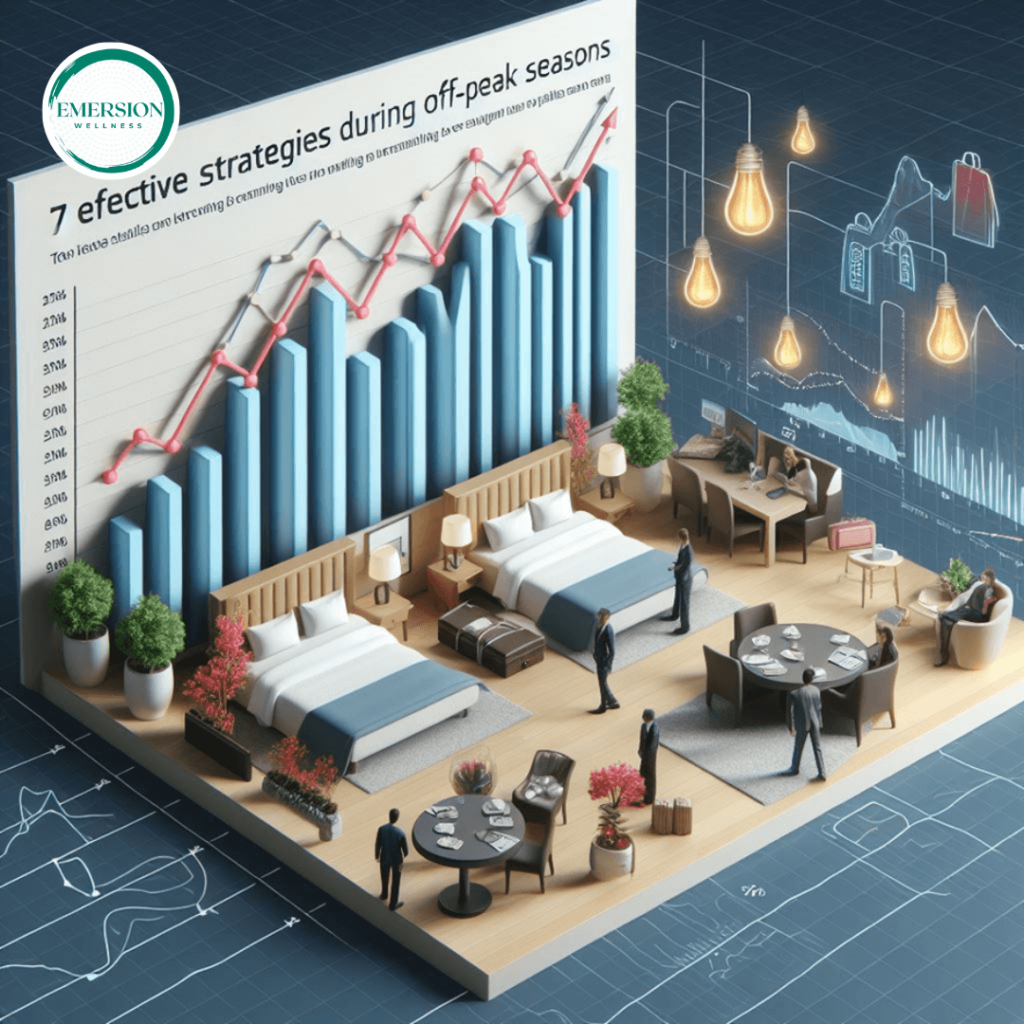In the ever-changing hospitality industry landscape, hotel managers and owners often face a common challenge - trying to understand how to increase sales in low season. As the influx of guests dwindles, revenue streams may seem like a mere trickle. But fear not, for we delve into proven strategies that go beyond conventional wisdom in the following lines. Picture this: a thriving hotel, even in the off-season. Intrigued? Let's embark on a journey of discover the secrets to Increase Hotel Sales in Low Season
Critical Takeaways
Before we delve into the strategies, here are some key takeaways to keep in mind:
- Strategic Partnerships: Collaborate with local businesses to create exclusive packages for guests.
- Digital Marketing Magic: Leverage the power of online platforms to reach a wider audience.
- Personalized Experiences: Tailor your services to meet the unique preferences of your guests.
- Dynamic Pricing: Implement a flexible pricing strategy to optimize how to increase sales in the low season.
- Revamp Your Offerings: Introduce new services or refurbish existing ones to entice guests.
- Employee Training: Empower your staff to provide exceptional guest experiences, creating lasting impressions.
- Data-Driven Decision Making: Utilize analytics to understand market trends and make informed choices.
Table of Contents
Increase Hotel Sales in Low Season: Strategic Partnerships - Elevate Your Offering through Collaboration
Local Business Bundles
Incorporate local experiences into your packages, partnering with nearby businesses for mutual benefit. Offer discounts to guests who explore these partnerships.
Exclusive Events
Collaborate with local event organizers to host exclusive events at your hotel to figure out how to increase sales in the low season. This not only attracts guests but also fosters community ties.
Loyalty Programs
Introduce loyalty programs in collaboration with neighboring businesses. Guests can earn points for patronizing both your hotel and these establishments.
Co-Marketing Campaigns
Run joint marketing campaigns with local businesses. Share the costs and amplify the reach, ensuring your hotel stays top-of-mind.
Increase Hotel Sales in Low Season: Digital Marketing Magic - The Art of Reaching Wider Audiences
Social Media Mastery
Leverage social media platforms to showcase the unique experiences your hotel offers. Run targeted ads during peak planning periods.
Influencer Collaborations
Partner with travel influencers to showcase your hotel. Their reach can significantly impact your hotel's visibility and desirability.
SEO Strategies
Optimize your website content for search engines. Target long-tail keywords related to your locality and unique offerings.
Email Marketing Excellence
Build a segmented email list and send targeted promotions during low-season periods. Personalization is key to capturing attention.
Increase Hotel Sales in Low Season: Personalized Experiences - Tailoring Services for Lasting Impressions
Guest Profiling
Collect data on guest preferences and use it to tailor their experience. From room amenities to recreational activities, personalization creates a memorable stay.
Custom Packages
Create personalized packages based on guest preferences. Whether it's a spa weekend or an adventure escape, offer options that cater to diverse tastes.
Personalized Loyalty Rewards
Tailor your loyalty programs to individual guests. Recognize and reward frequent visitors with bespoke offerings and discounts.
Anticipatory Service
Train your staff to anticipate guest needs. Going the extra mile to fulfill requests creates a positive and memorable experience.
Increase Hotel Sales in Low Season: Dynamic Pricing - Maximizing Revenue with Flexibility
Yield Management
Implement dynamic pricing strategies based on demand fluctuations. Adjust rates in real time to optimize how to increase sales in the low season.
Flash Sales
Create a sense of urgency with flash sales and limited-time promotions. This not only boosts revenue but also creates a buzz around your hotel.
Last-Minute Deals
Entice spontaneous travelers with last-minute deals. Capture those seeking instant getaways and fill empty rooms.
Midweek Specials
Encourage midweek bookings with exclusive discounts. This strategy helps balance occupancy rates throughout the week.

Increase Hotel Sales in Low Season: Revamp Your Offerings - Breathing New Life into Your Services
Renovation Projects
Invest in periodic renovations to keep your hotel looking fresh and modern. This not only attracts new guests but also encourages repeat visits.
Culinary Innovations
Revamp your menu with seasonal and locally-inspired dishes. Partner with local chefs for exclusive dining experiences.
Wellness Programs
Introduce wellness packages in collaboration with Emersion Wellness. Highlight the benefits of holistic well-being to attract health-conscious travelers.
Themed Events
Organize themed events and parties to create excitement during the low season. From festivals to exclusive celebrations, offer unique experiences.
Increase Hotel Sales in Low Season: Employee Training - Your Team as Ambassadors of Exceptional Service
Customer Service Training
Invest in customer service training programs for your staff. Equip them with the skills to handle diverse guest needs and exceed expectations.
Empowerment Culture
Foster an environment where employees feel empowered to make decisions that enhance guest experiences. Trusting your team pays dividends in guest satisfaction.
Continuous Learning
Encourage continuous learning for your staff. Staying updated on industry trends ensures they provide valuable insights to guests.
Team Building Retreats
Organize team-building retreats during the off-season. Strengthening team dynamics translates to a better guest experience.
Increase Hotel Sales in Low Season: Data-Driven Decision-Making - Unleashing the Power of Analytics
Market Analysis
Conduct thorough market analysis to identify trends and opportunities. Tailor your offerings based on the preferences of your target audience.
Guest Feedback Analysis
Regularly analyze guest feedback to identify areas of improvement. Addressing concerns promptly demonstrates a commitment to guest satisfaction.
Competitor Benchmarking
Benchmark your services against competitors. Identify gaps and capitalize on unique offerings that set your hotel apart.
Predictive Analytics
Harness predictive analytics to anticipate future demand. This allows you to adjust strategies to meet market fluctuations proactively.
Conclusion
In hotel management, it’s important to master how to increase sales in the low season. This can serve is a game-changer. By strategically forming partnerships, embracing digital marketing, personalizing guest experiences, implementing dynamic pricing, revamping offerings, investing in employee training, and leveraging data-driven decision-making, your hotel can weather the off-season and emerge stronger than ever.
FAQs
-
How can strategic partnerships benefit my hotel during the low season?
When figuring out how to increase hotel sales in the low season, strategic partnerships can generate additional revenue through collaborative packages, exclusive events, loyalty programs, and co-marketing campaigns. These partnerships enhance the guest experience, fostering loyalty and attracting new visitors.
-
What digital marketing strategies are effective for hotels in the off-season?
When figuring out how to increase hotel sales in the low season, social media mastery, influencer collaborations, SEO strategies, and email marketing excellence are crucial. These tactics increase visibility, engage potential guests, and drive bookings during low-demand periods.
-
Why is personalization important for hotel success during the low season?
When trying to understand how to increase hotel sales in the low season, personalized experiences create memorable stays, increasing guest satisfaction and loyalty. To achieve this, guest profiling, custom packages, personalized loyalty rewards, and anticipatory service are key components.
-
How can dynamic pricing strategies optimize revenue during low-demand periods?
Dynamic pricing involves adjusting room rates based on demand fluctuations. Implementing flash sales, last-minute deals, and midweek specials ensures your hotel remains competitive and profitable during off-peak times.
-
What role do wellness programs play in revamping hotel offerings?
Wellness programs, like those offered by Emersion Wellness, cater to health-conscious travellers. Highlighting holistic well-being can attract a niche market, boosting revenue through increased bookings and additional spa and F&B sales.
-
How does employee training contribute to exceptional guest experiences?
Employee training ensures that your staff provides outstanding customer service. An empowered and well-trained team can handle diverse guest needs, creating positive impressions and encouraging repeat visits.
-
What types of data-driven decisions are essential for hotel success?
Market analysis, guest feedback analysis, competitor benchmarking, and predictive analytics are crucial. These data-driven insights allow hotels to make informed decisions, stay competitive, and adapt to changing market trends.
-
How can a hotel effectively implement market analysis for better performance?
Conducting thorough market analysis helps hotels identify trends and opportunities. This information enables hotels to tailor their offerings to meet the preferences of their target audience, ultimately driving bookings.
-
What steps can hotels take to address guest feedback effectively?
Hotels should regularly analyse guest feedback and address concerns promptly. Demonstrating a commitment to guest satisfaction by actively responding to feedback can enhance the hotel's reputation and improve guest experiences.
-
Why is predictive analytics important for hotels in the low season?
Predictive analytics allows hotels to anticipate future demand, enabling proactive strategy adjustments. Hotels can optimize their offerings and maintain profitability during off-peak periods by staying ahead of market fluctuations.
Ready to transform your hotel's performance? Contact Emersion Wellness today for innovative revenue-generating ideas. Explore the Emersion Wellness weight loss program, a proven strategy to boost hotel revenue through increased room bookings, spa reservations, and food and beverage sales.
Also, see Revolutionizing Hospitality: Through Hotel Amenities Ideas in Bali, Indonesia

I'm Nathan Baws, a nutrition nerd, exercise and weight loss expert, and an unwavering advocate for good health. As the founder of Emersion Wellness, I'm passionate about crafting Seamless Weight Loss Programs to supercharge hotel revenue and transform lives. We've pioneered the World's First Plug & Play Weight Loss Programs for top hotels and resorts, sparking a wellness revolution. Beyond my professional journey, you'll often find me hiking, swimming, and riding the waves, embracing every moment in nature. Join me on this exhilarating journey towards diet, health and wellness.

